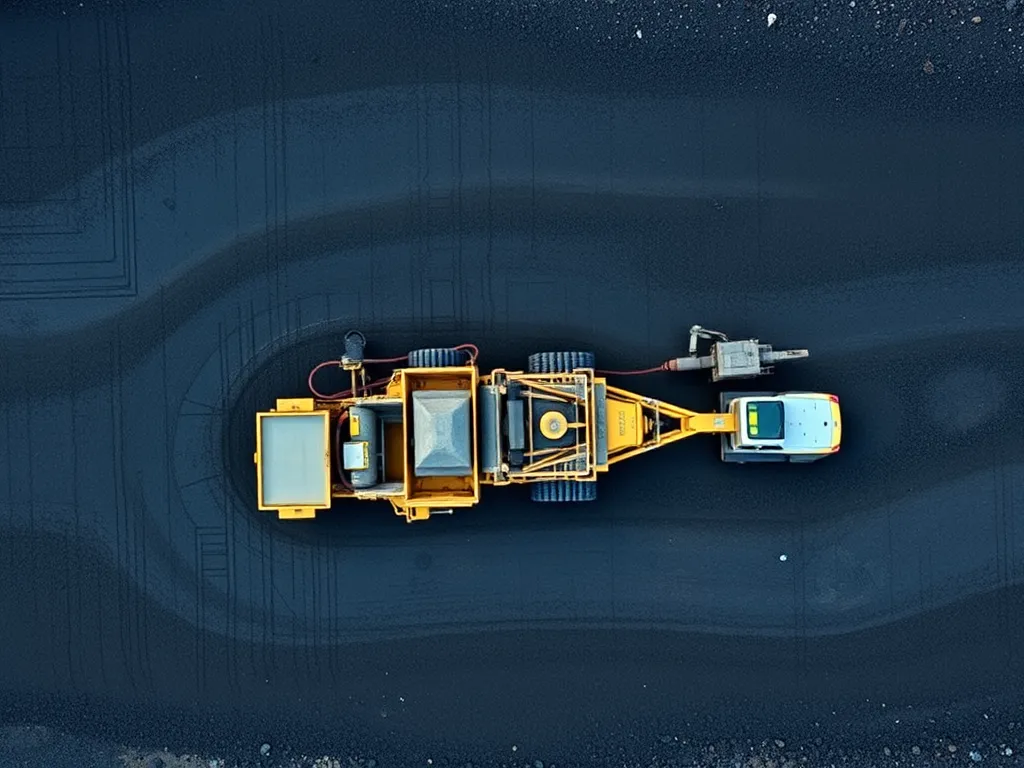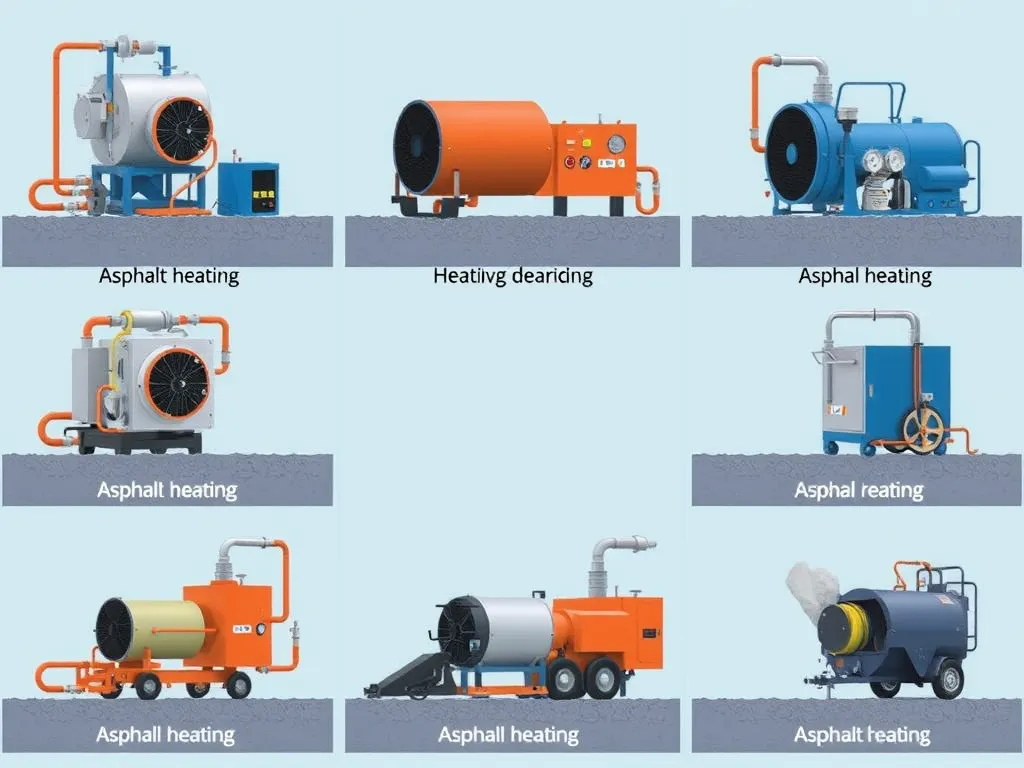What Really Goes Into Asphalt Installation Costs?
Published on: November 12, 2025 | Last Updated: April 14, 2025
Written By: George Voss
A detailed breakdown of asphalt installation costs shows where every dollar goes – from materials and labor to site prep and machinery. Typical projects run $3-$7 per square foot, with exact prices depending on project size, asphalt type (hot-mix or cold-mix), and regional labor rates. Unlike concrete paving, asphalt costs factor in petroleum-based binder prices that fluctuate with oil markets. Key expenses include aggregate materials, compaction equipment, and drainage solutions – all critical for lasting results.
This guide covers hot-mix vs cold-mix price differences, recycled asphalt savings (up to 30% less), and crew rates ranging $45-$75/hour. You’ll get specific cost examples: a 20×20 driveway ($1,200-$2,800) versus 2000 sq ft commercial lots ($6,000-$14,000). We break down regional price shifts (Northern states pay 15% more for freeze-resistant mixes) and eco-options like permeable asphalt ($8-$12/sq ft). Learn how thickness requirements (2-3 inches for driveways) and base preparation impact your final bill.
Contents
- Understanding Asphalt Installation Costs
- Material Costs for Asphalt Installation
- Labor Costs for Asphalt Installation
- Average Asphalt Cost Per Square Foot
- Asphalt Driveway Installation Costs
- Additional Cost Considerations
- Calculating Asphalt Requirements
- Regional Variations in Asphalt Installation Costs
- Asphalt Maintenance and Long-term Costs
- Environmental Considerations in Asphalt Installation
- Frequently Asked Questions (FAQs)
- Closing Thoughts
- Additional Resources for You:
Understanding Asphalt Installation Costs
Asphalt costs shift based on three main parts: stuff used, worker pay, and site work. Each part changes the final price. Let’s break down how these pieces work together.
Key Factors Influencing Asphalt Pricing
Material type, crew skill, and land shape drive price swings. Hot-mix asphalt runs $3-$7 per square foot. Cold-mix costs less but wears faster. Recycled mix saves 20-30% but needs more prep work.
Material, Labor, and Site Preparation Variables
Base layers add $1-$3 per square foot. Poor soil may need rock or geo-grids ($0.50-$2 extra). Crews charge $50-$80 per hour. Big machines like pavers add $200-$500 daily. Permits range from $100-$1,000 based on job size.
Up next: How material picks shape your budget from hot-mix to recycled blends.
Material Costs for Asphalt Installation
Asphalt material costs form 40-60% of total project budgets. Choices in mix types, recycled content, and raw materials drive price shifts. Know these key parts to plan smart.
Hot-mix Vs. Cold-mix Asphalt Pricing
Hot-mix asphalt (HMA) costs $100-$200 per ton. Made at 300°F, it’s used for roads and driveways. Cold-mix asphalt runs $50-$100 per ton. Mixed at low temps, it suits quick fixes but wears faster.
| Type | Price/Ton | Best For |
|---|---|---|
| Hot-Mix | $100-$200 | Long-term paving |
| Cold-Mix | $50-$100 | Temp patches |
Recycled Asphalt Cost Efficiency
Recycled asphalt (RAP) cuts new material needs by 20-40%. Priced at $10-$20 per ton plus $5-$15 milling fees, RAP lowers asphalt driveway cost per square foot. It blends old pavement with 3-5% new binder for strength.
| Material | Price/Ton | Savings |
|---|---|---|
| New Asphalt | $80-$120 | Base rate |
| RAP | $10-$20 | Up to 75% |
Asphalt Binder and Aggregate Expenses
Binder (asphalt cement) makes up 55-65% of mix costs. Prices swing with oil rates – $600-$800 per ton in 2024. Aggregates (crushed stone, sand) form 30-40% of costs at $15-$30 per ton. PG 64-22 binder grades handle most climates.
| Component | Role | Cost Impact |
|---|---|---|
| Binder | Glue | 55-65% |
| Aggregate | Structure | 30-40% |
With material costs mapped, labor fees shape your next cost layer. Crew rates and gear rentals add 30-50% to asphalt installation prices.
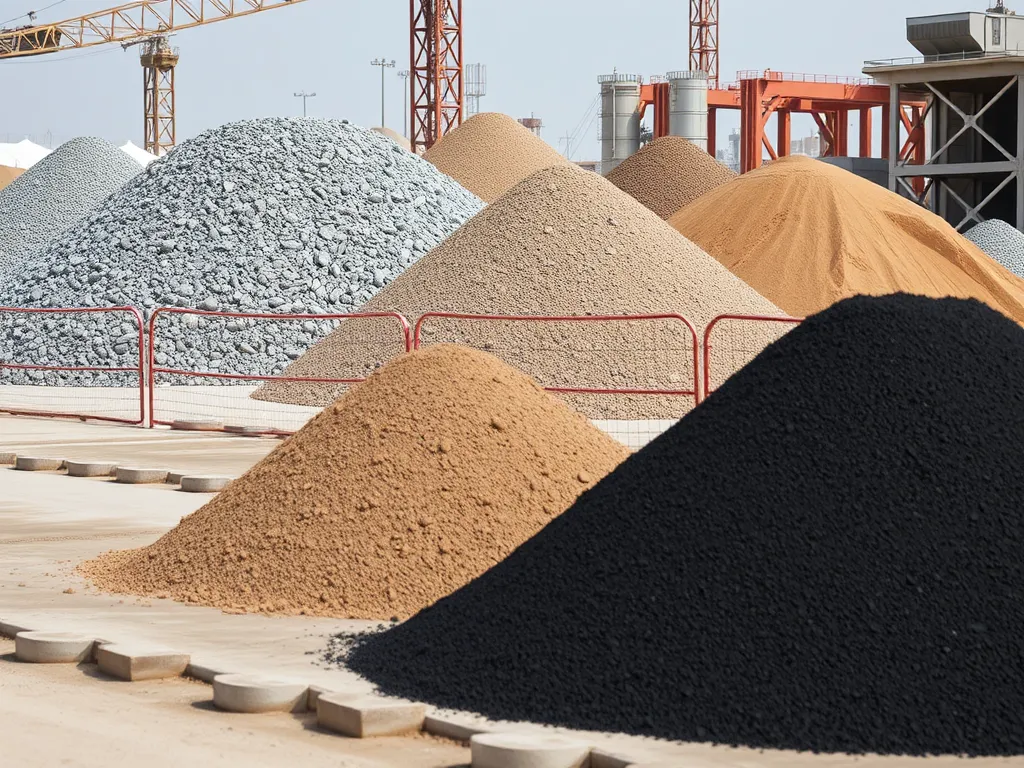
Labor Costs for Asphalt Installation
Workforce outlays form 35-50% of total asphalt installation costs. Skill, location, and job complexity sway final bills. Quality craftsmanship impacts pavement longevity, making labor a critical investment.
Professional Paving Crew Rates
Teams bill $45-$75 hourly or $2.50-$5.50 per square foot. Union crews in urban zones might hit $85/hour, while rural contractors often stay below $60. NICET-certified operators add 10-15% to rates but boost precision. A 10-person crew typically lays 500-800 sq ft daily.
Equipment and Machinery Fees
Pavers run $150-$300 hourly, milling machines $100-$250. Compact rollers add $75-$150 daily. Mobilization fees for hauling gear start at $500. Fuel and upkeep tack on 15-20% to machinery totals. Big jobs spread fixed costs thin—a 2,000 sq ft driveway might pay $1,200 for gear, while 10,000 sq ft lots drop this to $0.80/sq ft.
With labor and machinery tallied, material inputs dominate the next cost layer. Tonnage math and mix formulas dictate what follows.
Also See: Community Impact Of Asphalt Recycling
Average Asphalt Cost Per Square Foot
Asphalt installation costs typically range between $2.50-$5.00 per square foot for residential projects and $3.50-$7.50+ for commercial work. These ranges account for material quality, regional pricing, and project complexity. Exact pricing depends on three key variables: project type, pavement thickness, and compaction standards.
Residential Vs. Commercial Pricing Differences
Homeowners generally pay 20-40% less per square foot than commercial clients. This gap stems from scale efficiencies and differing engineering specs:
| Residential (Driveways) | Commercial (Parking Lots/Roads) |
|---|---|
| $2.50 – $5.00/sq ft | $3.50 – $7.50+/sq ft |
| 2-3″ typical thickness | 4-6″ minimum thickness |
| Standard PG 58-28 binder | High-performance PG 64-22 binder |
Commercial projects require heavier rollers (10-ton vs 5-ton), multi-day compaction testing, and traffic control measures – all adding to labor expenses.
Thickness and Density Requirements
Every 1″ of asphalt adds $0.75-$1.25 per square foot to material costs. Standard residential driveways use 2-3″ of hot mix asphalt (HMA) compacted to 92% density. Commercial pavements demand 4-6″ layers compacted to 95% density using nuclear density gauges.
Density directly impacts material needs: • 2″ layer = 1 ton covers 80 sq ft • 4″ layer = 1 ton covers 40 sq ft Commercial projects often use 145-150 lbs/ft³ compacted density versus residential 140-145 lbs/ft³ – a 5% increase requiring 0.3 extra tons per 1,000 sq ft.
With per-square-foot costs clarified, let’s examine how these rates apply to actual driveway installations.
Asphalt Driveway Installation Costs
Driveway costs hinge on size, prep work, and mix choice. Prices swing from $3 to $7 per square foot. Let’s break down real-world examples.
20×20 Driveway Cost Calculation Example
A 20×20 space covers 400 square feet. Using $4.50 per square foot (mid-range), base costs hit $1,800. Add $800 for grading or rock base. Total: $2,600-$3,200. Hot-mix asphalt costs $100-$150 per ton here – needs 5 tons.
2000 Sq Ft Driveway Paving Estimates
Big jobs cut per-square costs. A 2000 sq ft drive runs $2.50-$6 per square foot. Expect $5,000-$12,000 total. Base layers (6″ crushed stone) add $1.50-$3 per sq ft. Drainage pipes? Tack on $1,000-$2,500. Recycled asphalt drops costs 20-30% here.
Resurfacing Vs. Full Replacement Costs
Resurfacing (2″ layer) costs $1-$3 per sq ft. Needs solid base. Full replacement ($4-$8 per sq ft) removes old layers (adds $0.50-$1.50 per sq ft). Choose resurfacing if base stays intact. Cracks over 1/4 inch wide? Go full replacement.
These figures set the stage for hidden fees. Next up: permits, drainage tweaks, and soil fixes that spike your bill.
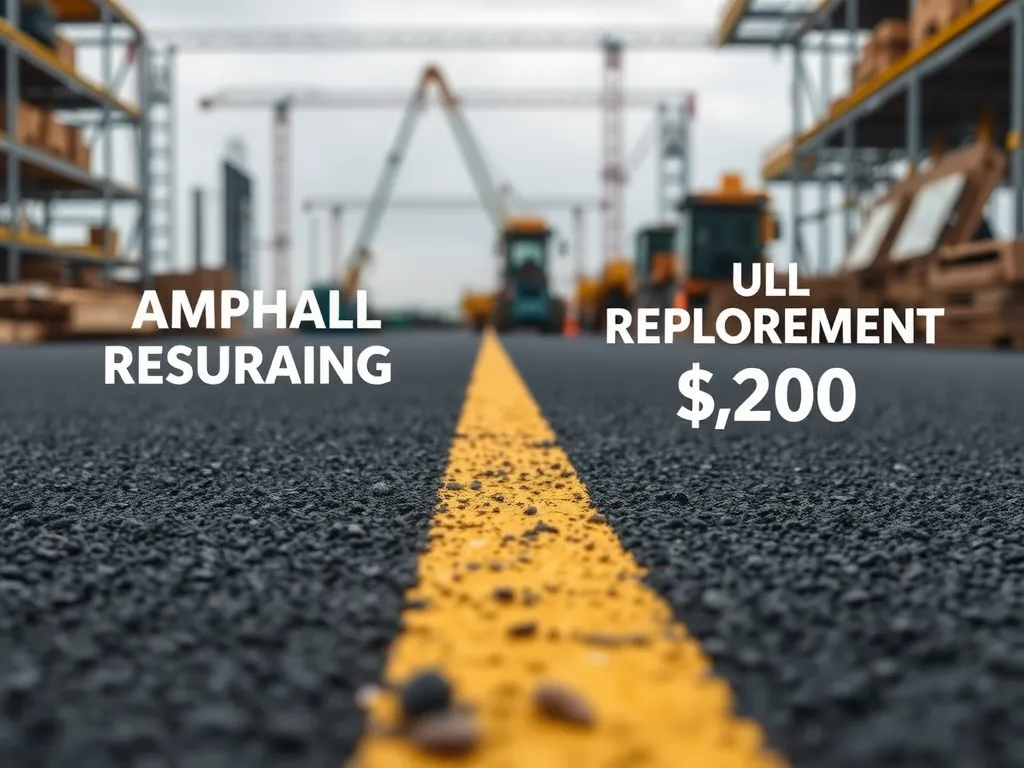
Additional Cost Considerations
Beyond material and labor expenses, asphalt installation costs include critical site-specific factors. These often-overlooked items account for 15-30% of total project budgets.
Base Preparation and Subgrade Work
Proper foundation work prevents asphalt cracking. Costs vary based on existing soil quality:
- Excavation: $1.50-$3.00 per sq ft for removing unstable soil
- Crushed stone base: $0.80-$1.50 per sq ft for 6″ compacted layer
- Geotextile fabric: $0.25-$0.40 per sq ft for clay-heavy soils
Projects requiring full subgrade reconstruction average $2.50-$4.00 per sq ft – nearly half the total asphalt driveway cost per square foot.
Drainage Solutions and Slope Adjustments
Poor drainage cuts asphalt lifespan by 40%. Common upgrades include:
- Catch basins: $300-$800 each
- French drains: $10-$16 per linear foot
- Slope regrading: $0.50-$1.25 per sq ft for 2% minimum pitch
Permeable asphalt installations add $1.00-$3.00 per sq ft but reduce long-term maintenance costs.
Permitting and Inspection Fees
Local regulations impact asphalt installation prices through:
- Zoning permits: $50-$400 for residential projects
- Stormwater management reviews: $150-$1,200
- Compaction tests: $75-$150 per inspection
Urban projects typically face 30% higher fees than rural installations due to stricter environmental codes.
With these factors accounted for, accurate quantity calculations become the next critical step. Let’s examine how to convert square footage to material tons and optimize purchase volumes.
Calculating Asphalt Requirements
Accurate material calculations prevent overspending on asphalt installation costs. Projects require precise tonnage estimates based on area size and compaction rates.
Square Footage to Tons Conversion
Asphalt weighs 145 lbs per cubic foot. Use this formula: Square feet × thickness (inches) × 145 ÷ 2,000 = tons needed
- Driveway example: 1,000 sq ft × 3″ depth = (1,000 × 0.25 × 145) ÷ 2,000 = 18.1 tons
- Parking lot example: 5,000 sq ft × 4″ depth = (5,000 × 0.33 × 145) ÷ 2,000 = 119.6 tons
Add 5-10% extra for compaction and waste. Cold-mix asphalt requires 12% more tonnage than hot-mix due to lower density.
Bulk Purchase Discount Considerations
Suppliers offer tiered pricing for large asphalt orders. Typical thresholds:
- 10-50 tons: $3-$5/ton discount
- 50-100 tons: $6-$8/ton discount
- 100+ tons: $9-$12/ton discount
Combining multiple projects into one order often triggers bulk rates. A 200-ton purchase at $12/ton discount saves $2,400. Check minimum load fees – some plants charge $150-$300 for deliveries under 20 tons.
With material quantities locked down, let’s examine how geographic location shapes asphalt installation prices.
Regional Variations in Asphalt Installation Costs
Asphalt costs swing by location due to climate needs and local wage rates. A driveway in Florida may cost 15% less than one in Minnesota for the same square footage. These shifts stem from material specs and crew pay scales.
Climate Impact on Material Choices
Hot states like Arizona use stiffer binders (PG 76-16) to resist rutting. Cold zones like Maine require flexible mixes (PG 58-28) to handle freeze-thaw cycles. These specialized binders add $0.50-$1.25 per square foot. Wet regions often need porous asphalt or added drainage layers, tacking on $2-$4 per sq ft.
Local Labor Rate Comparisons
City crews charge $45-$75 per hour versus $35-$55 in rural areas. Union shops in states like Illinois cost 20% more than non-union teams in Texas. High-demand coastal metros see rates 30% above national averages. These rates directly sway total asphalt driveway cost per square foot.
Up next: How maintenance plans shape your long-term spend. Crack sealing costs $0.15-$0.30 per linear foot, while sealcoating runs $0.14-$0.25 per sq ft every 3 years.
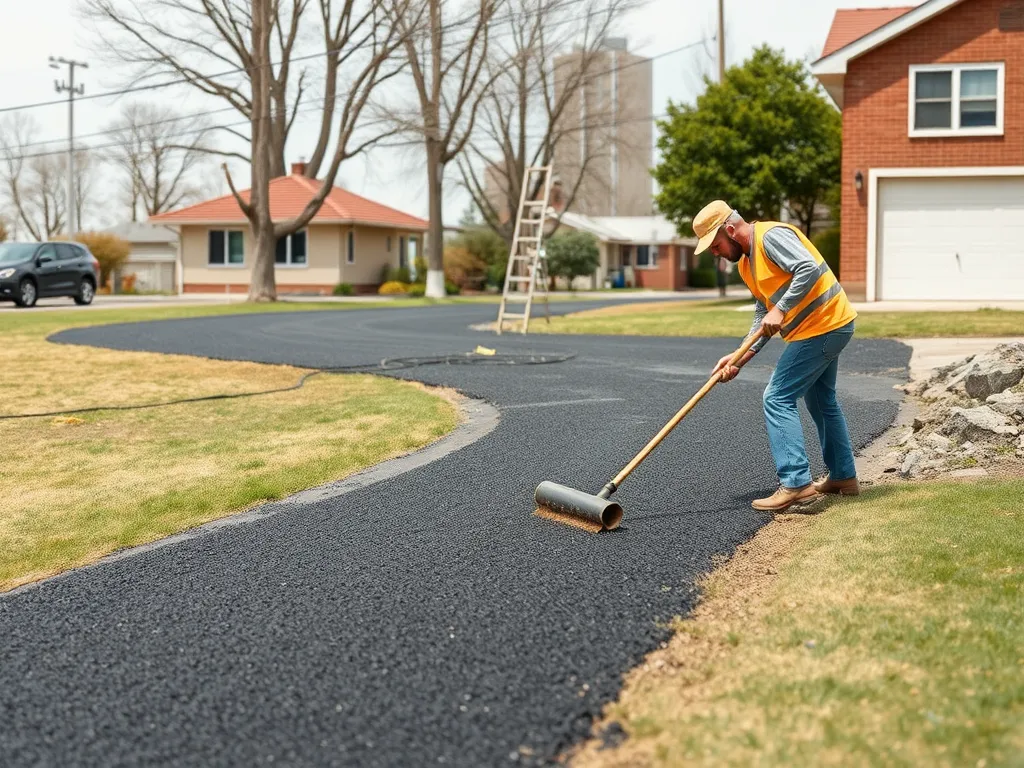
Asphalt Maintenance and Long-term Costs
Maintaining your asphalt surfacing impacts total asphalt installation costs across its 15-20 year lifespan. Proactive care prevents costly rebuilds, with two primary upkeep tasks driving annual budgets.
Sealcoating Frequency and Expenses
Fresh sealcoating adds $0.14-$0.25 per square foot, applied every 3-5 years. This thin coal-tar or asphalt-based layer blocks UV rays and water intrusion. Contractors typically charge $1.10-$1.60 per square foot including labor and materials. A standard 1,000 sq ft driveway runs $1,100-$1,600 per application cycle.
Crack Repair and Patching Costs
Ignoring cracks wider than ¼” can triple asphalt driveway installation cost through base damage. Repair methods vary by severity:
| Method | Cost per Sq Ft | Lifespan |
|---|---|---|
| Rubberized crack filler | $0.50-$1.20 | 1-3 yrs |
| Infrared patching | $2.00-$4.50 | 5-8 yrs |
| Full-depth replacement | $4.00-$6.00 | 10-15 yrs |
Annual inspection budgets of $200-$500 for minor fixes avoid $2,000+ partial rebuilds. Combining sealcoating with crack repairs during off-peak months (April-May or September-October) can trim labor fees by 15%.
Smart maintenance planning directly affects how asphalt cost per square foot performs over decades. Up next: How material choices impact both initial pricing and planetary health.
Environmental Considerations in Asphalt Installation
Asphalt projects now factor in planetary impacts alongside financial outlays. Two options – recycled materials and porous surfaces – affect both budgets and runoff management.
Recycled Material Cost Benefits
Using RAP (Reclaimed Asphalt Pavement) cuts material bills by 30-50% compared to virgin mixes. Contractors blend 15-35% recycled content without sacrificing quality. Key savings include:
- $18-$25/ton for RAP vs $45-$65/ton for new hot-mix
- No landfill tipping fees ($50-$150/load)
- Possible tax credits under state recycling initiatives
Projects with 50% RAP content report $1.50-$2.25/sq ft savings on asphalt installation prices. This makes 1,000 sq ft driveways $1,500-$2,250 cheaper upfront.
Permeable Asphalt Premiums
Porous pavements cost $8-$15/sq ft – 25-40% above standard mixes. Special open-graded stones and polymer-modified binders add $3.50-$4.75/sq ft. Installation requires:
- 12-18″ crushed stone base ($1.20-$2.10/sq ft)
- Geo-textile fabrics ($0.35-$0.60/sq ft)
- Skilled labor for 30-40% void spaces
Long-term savings offset initial costs. Permeable systems slash stormwater fees by 60-80% in cities like Philadelphia and Seattle. Some counties offer $0.50-$1.25/sq ft tax rebates for installations.
Factoring in runoff management and material reuse shifts total asphalt driveway installation cost calculations. Looking at common paving queries reveals more ways to optimize budgets.
Frequently Asked Questions (FAQs)
What Factors Should I Consider When Choosing an Asphalt Contractor?
When selecting an asphalt contractor, consider their experience, customer reviews, licensing, and insurance. It’s also important to ask about their materials, techniques, estimated timeline, and whether they provide a warranty for their work. Get multiple quotes to compare services and costs before making your decision.
How Can I Reduce My Asphalt Installation Costs?
To minimize asphalt installation costs, consider options like scheduling installation during off-peak seasons, using recycled asphalt, or taking on some preparatory work yourself. Additionally, obtaining multiple quotes can help you find the best price for quality work.
Are There Financing Options Available for Asphalt Projects?
Yes, many contractors offer financing options or payment plans for asphalt projects. You can also look into personal loans, home improvement loans, or credit card options to cover installation costs. Be sure to review interest rates and terms carefully before proceeding.
How Long Will My Asphalt Pavement Last?
With proper installation and maintenance, asphalt pavement can last 15 to 20 years. Factors that influence its lifespan include the quality of materials, correct thickness, drainage, climate conditions, and maintenance practices such as sealcoating and crack repair.
What Maintenance Do I Need to Perform on My Asphalt Driveway?
Regular maintenance for asphalt driveways includes sealcoating every 3 to 5 years, filling cracks promptly, and ensuring proper drainage to prevent water damage. Keeping the surface clean from debris and heavy loads can also prolong its lifespan.
Can I Install Asphalt Myself to Save Money?
While DIY asphalt installation might seem cost-effective, it requires specialized equipment and knowledge to ensure proper application. Incorrect installation can lead to costly repairs in the future. It’s often advisable to hire professionals unless you have the necessary experience and tools.
Do I Need a Permit for Asphalt Installation?
Permit requirements vary by location. Typically, residential asphalt projects may not require a permit, while larger commercial projects usually do. It’s best to check with your local municipality or the contractor to ensure compliance with regulations.
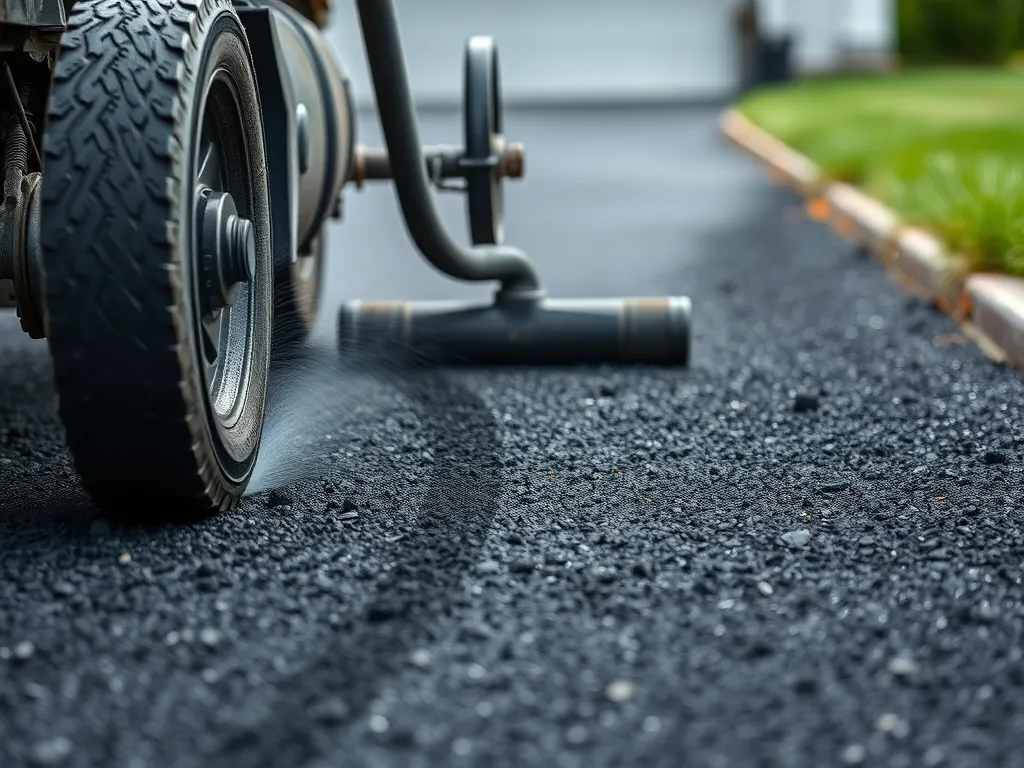
Closing Thoughts
Understanding asphalt installation costs is crucial for anyone considering a paving project. From material and labor expenses to regional variations, each factor plays a significant role in your total budget. Whether you’re planning for a new driveway or resurfacing an existing one, grasping the financial landscape will help you make informed decisions.
Take advantage of the information available. Getting multiple quotes can save you money and help you select a reputable contractor. Don’t forget to factor in ongoing maintenance costs, which can impact your overall investment.
For further information and detailed cost calculators, be sure to visit the Asphalt Calculator USA. It’s a fantastic resource to help you plan your asphalt project effectively.
Additional Resources for You:
- Kett, I. (1999). Asphalt Materials and Mix Design Manual. Oxford: Elsevier Science.
- How Much Does an Asphalt Driveway Cost in 2025?
- Current Asphalt Driveway Cost: A Comprehensive Pricing Guide for 2024 – Asphalt Industrial
- How Much Does Asphalt Paving Cost? A Complete Guide
- Average Cost of Asphalt Driveway in 2023: A Comprehensive Look

